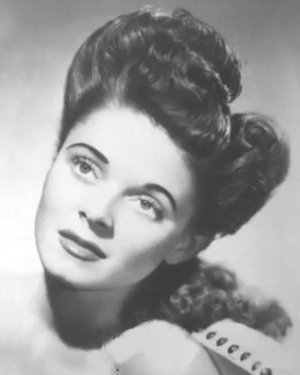Betty Brewer
Actress and vocalist Betty Brewer sang with Tommy Dorsey in the early 1940s but is perhaps best remembered for her Decca recordings of the early 1950s. As a solo artist, Brewer had a relatively successful career in the late 1940s and into the 1950s, working regularly on radio, television, and stage. By the 1960s, however, she had disappeared.
A native of Hot Springs, Arkansas, nothing is written about Brewer’s early life. She first appears in 1942, when she sang with Ray Heatherton’s sweet orchestra. She joined Dorsey in June 1943, replacing Liz Tilton. Dorsey made a big production out of “discovering” Brewer and planned to give her a major build-up, something he’d never before done with a female vocalist. While Brewer’s transition from the upper crust hotel circuit to the ballroom circuit proved successful, the singer never achieved the same level of success as had Dorsey’s previous two build-ups—Jack Leonard and Frank Sinatra. Still, she proved popular enough with the bandleader that she survived his August 1943 purge, when he fired almost his entire orchestra and built a new band. Brewer remained with Dorsey until April 1944, when she left to go solo, though unfortunately her tenure with the famous bandleader was entirely during the American Federation of Musicians’ recording ban, and she didn’t enter the studio with him.
Solo Career
After leaving Dorsey, Brewer joined the road company of Cole Porter’s Let’s Face It, where she played the lead. She then toured Europe in a dramatic role. Brewer was back to singing in mid-1946 when she won the “pick a dame” contest on New York radio station WHN to fill in the quartet of Hi, Lo, Jack and the Dame. The singing group had recently reorganized after breaking up several years prior when male members Bob Evans, Dave Vogel, and Don McCleod had entered the service. Their original female member had since gotten married and retired. Brewer herself soon retired for the same reason.
Brewer returned to singing again in mid-1947. To welcome her back, Swank Records threw a yachting party on a boat owned by Cliff “Ukelele Ike” Edwards. That same year, Brewer recorded with Bill Gale and his Globe Trotters on Columbia. She also earned a regular spot on the CBS radio program Here’s to You, sometimes known as Hires to You after its sponsor, Hires Root Beer. On the program, which ran until July 1948, she was teamed with a vocal group and billed as Betty Brewer and Her Boyfriends.
In November 1949, based on the strength of her vocals for the Gordon Jenkins recording of “Don’t Cry, Joe” earlier that year, Decca Records inked Brewer to a contract of her own. She recorded several songs for the label in early 1950, two of which were re-released in 1952. As a Decca artist, Brewer enjoyed a short span of popularity, appearing on several television programs in 1950 and 1951, including the musical drama Downbeat and the Little Show, both on NBC. She also appeared on DuMont’s Cavalcade of Bands, ABC’s Holiday Hotel,[1] and The Ed Sullivan Show, where she sang with Jenkins.[2] She also continued to sing on radio during this time.
Brewer’s career tapered off after her Decca contract expired. In 1953, she appeared on the Bill Cullen Show and recorded with Ted Tyle’s band. In the mid-1950s, she became a regular on the Dorsey Brothers’ television program Stage Show. She then vanished from the public record.
Notes
Sources
- “Betty Brewer.” OTRRpedia. Accessed 18 Jan. 2018.
- The Online Discographical Project. Accessed 18 Jan. 2018.
- “Readying the Down Beat Show.” Down Beat 15 May 1942: 2.
- “Night Club Reviews: Biltmore Hotel, Fountain Room, New York.” Billboard 27 Jun. 1942: 12.
- “On the Stand: Ray Heatherton.” Billboard 19 Dec. 1942: 23.
- “Night Club Reviews: Shubert, St. Louis.” Billboard 5 Jun. 1943: 16.
- “Betty Brewer Newest T. Dorsey Thrush.” Billboard 26 Jun. 1943: 24.
- “TD Back on Lot, Has New Chirp.” Down Beat 1 Jul. 1943: 11.
- “Dead Weight Cut Seen in Dorsey Ork Notice Move.” Billboard 14 Aug. 1943: 13.
- “TD Holds Eight Sidemen From Band on Coast.” Down Beat 1 Oct. 1943: 1.
- “Bands Dug by the Beat: Tommy Dorsey.” Down Beat 15 Nov. 1943: 16.
- “T. Dorsey Tops Philly Earle Mark.” Billboard 19 Feb. 1944: 25.
- “Bonnie Lou Is New TD Chirp.” Down Beat 15 May 1944: 4.
- “Where Is?” Down Beat 15 Feb 1945: 10.
- “Betty Brewer Wins Contest.” Down Beat 12 Aug. 1946: 3.
- “Welcome Back.” Down Beat 18 Jun. 1947: 2.
- “Record Possibilities.” Billboard 10 Sep. 1949: 36.
- “Decca Inks Morris Ork, Betty Brewer.” Billboard 19 Nov. 1949: 20.
- “Music As Written.” Billboard 13 May. 1950: 20.
- “Television.” Syracuse Herald-Journal [Syracuse, New York] 9 May 1950: 15.
- Lilley, George. “Little Things about the Stars.” McKean County Democrat [Smithport, Pennsylvania] 1 Jun. 1950: 3.
- “TV Music Of Note.” Down Beat 2 Jun. 1950: 4.
- “TV Music Of Note.” Down Beat 16 Jun. 1950: 4.
- Vernon, Terry. “Tele-Vues.” The Long Beach Independent [Long Beach, California] 5 Oct. 1950: 22-A.
- “Television.” Syracuse Herald-Journal [Syracuse, New York] 24 Oct. 1950: 25.
- Advertisement. The Syracuse Post Standard [Syracuse, New York] 19 Nov. 1950: 30.
- “Record Reviews.” Billboard 31 May. 1952: 40.
- “TV This Week.” The Lowell Sun [Lowell, Massachusetts] 22 Jul. 1952: 54.
- “Headliners On.” The San Antonio Express Radio Television Guide [San Antonio, Texas] 22 Feb. 1953: 3.
- “In the Groove.” The Amarillo Daily News [Amarillo, Texas] 29 May 1953: 26.
